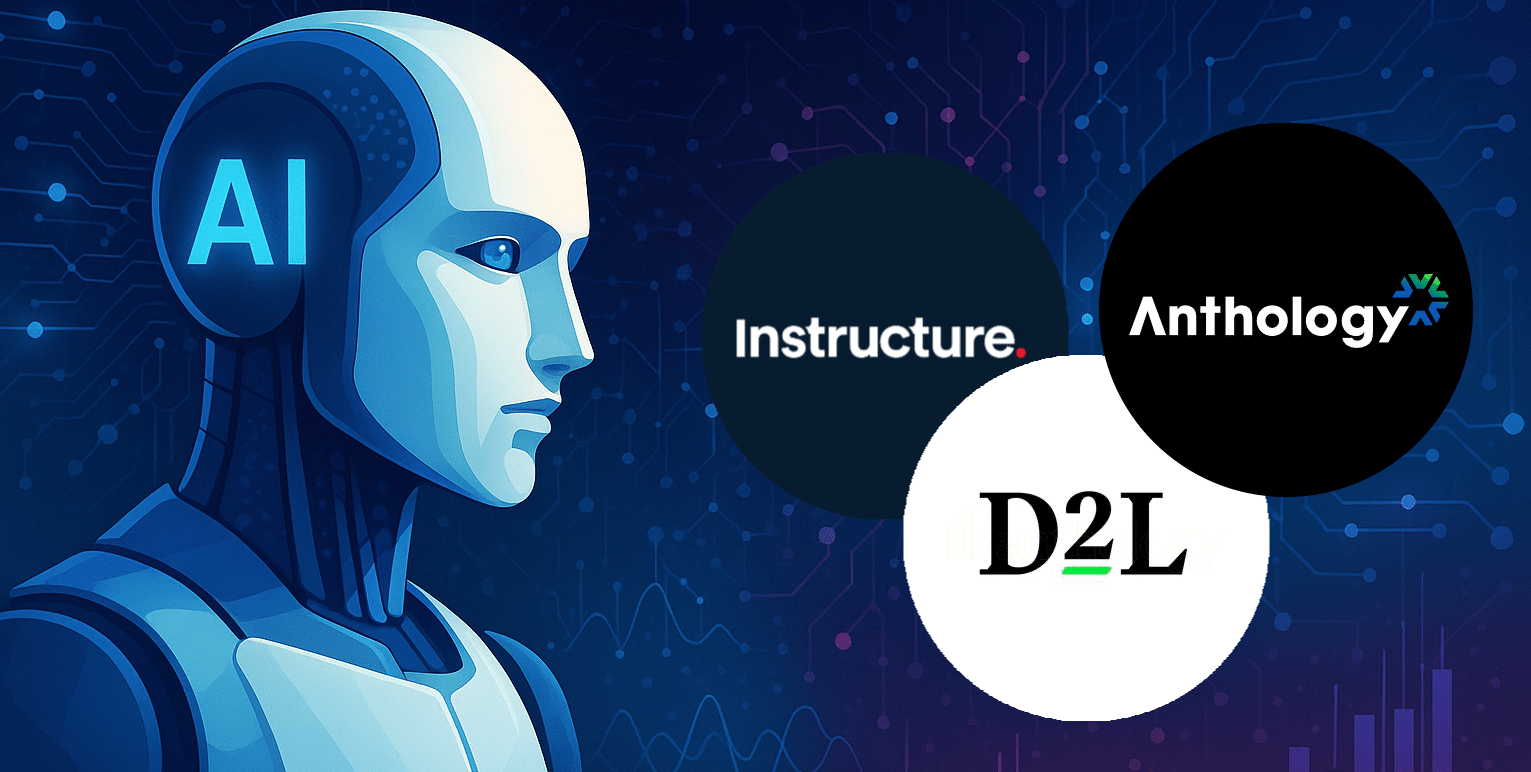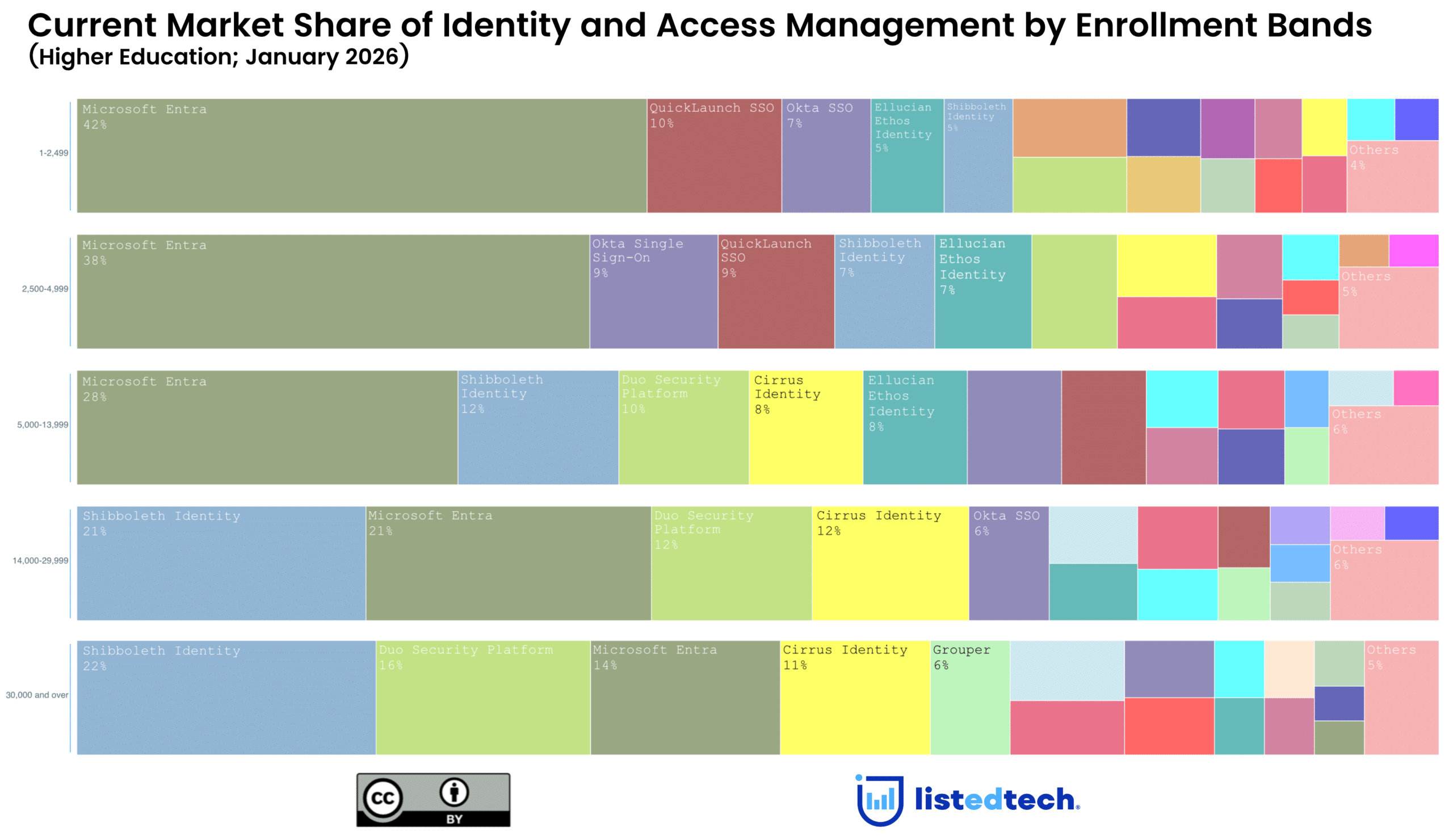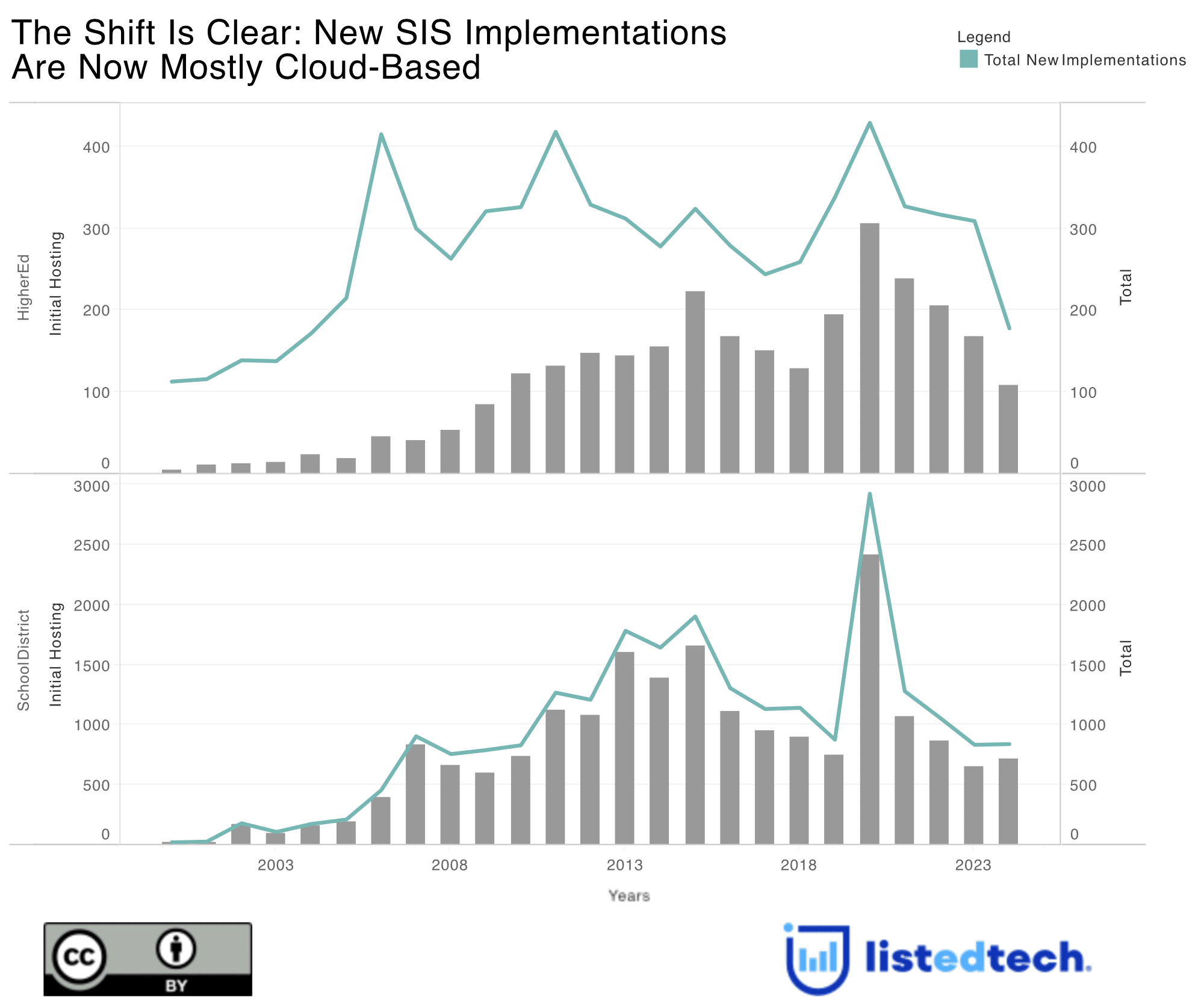
Key Takeaways:
- AI as the Differentiator: Blackboard, D2L, and Instructure are all embedding AI into their LMS offerings, but with distinct strategies: enterprise integration (Blackboard), student-facing interactivity (D2L), and extensibility with embedded LLMs (Instructure).
- Shaping the Learning Experience: Each vendor is aligning AI with different priorities: immersive and connected learning (Blackboard), accessibility and pedagogy (D2L), and career pathways and openness (Instructure).
- Strengths as Potential Weaknesses: Following the “Winner’s Curse” concept, past strengths—enterprise integration, pedagogy-driven trust, or open modularity—could hinder adaptability as the LMS market undergoes an AI-driven paradigm shift.
Last month, Anthology, D2L, and Instructure used their annual conferences to outline upcoming product roadmaps and long-term strategies. Moodle will do the same at its own event in September. Together, these gatherings highlight where the LMS market is headed.
What stands out isn’t just the new features being announced, but the bigger bets each vendor is making on AI, student experience, institutional priorities, and ultimately, the future of learning.
Blackboard (Anthology): AI-Enhanced Experiences and Institutional Integration
| Announcement | Summary | Implication for Anthology’s Vision |
|---|---|---|
| Outcomes in Blackboard | Supports learning outcomes alignment, curriculum mapping, and accreditation. Built on Mastery Gradebook. Available in core license January 2026. | Strengthens academic planning and continuous improvement across departments. |
| Anthology Virtual Assistant (AVA) | Adds AI features: Automations (nudges), Responses (Q&A), Feedback Assistant, and Playground (student sandbox). Early adopter programs through June 2026. | Expands personalized support for students and faculty while reinforcing transparency. |
| AI Design Assistant for Documents | Extends existing AI tools to support document creation, formatting, and knowledge checks aligned to objectives. | Streamlines instructional design workflows with embedded AI. |
| Blackboard–Reach Integration | Connects LMS and CRM, giving advisors and faculty access to student alerts and activity. | Moves toward unified lifecycle support by linking teaching and advising. |
| Immersive Video in Video Studio | Introduces 360° video and VR handoff for immersive experiences. | Adds new modalities for interactive, real-world simulations. |
Vision Summary: Anthology is evolving Blackboard into a deeply integrated enterprise platform, blending LMS, SIS, and CRM while embedding AI to enhance both teaching and personalized learning.
Brightspace (D2L): Trust-Driven Innovation Rooted in Pedagogy
| Announcement | Summary | Implication for D2L’s Vision |
|---|---|---|
| AI Personalization Features | Tools that adapt pacing, recommend content, and assist educators with assessments. | Aligns AI to pedagogy and measured personalization. |
| CreateSpace Tool | Collaborative course design and content reuse environment, supporting credential remixing. | Expands flexibility for institutions to repurpose materials into new credentials and delivery models. |
| Accessibility Plus | Combines AI-powered recommendations with human remediation to improve accessibility. | Reinforces D2L’s position as the most accessibility-focused LMS. |
| Micro-credentials & Skills Pathways | Supports stackable credentials with personal assessments and self-reflection. | Broadens D2L’s learner profile, connecting to Lumi Tutor for lifelong learning. |
| Lumi Tutor | Student-facing AI offering interactive H5P activities and multi-channel access (Brightspace, SharePoint, services portals, websites). | Positions Brightspace as a “digital campus hub” where all learner interactions flow back into the LMS. |
Vision Summary: D2L grounds its innovation in accessibility, ethics, and pedagogy, while differentiating with a student-facing AI strategy through Lumi Tutor—multi-channel, interactive, and designed to widen the context of learner engagement.
Canvas (Instructure): Platform Extensibility and AI-First Personalization
| Announcement | Summary | Implication for Instructure’s Vision |
|---|---|---|
| IgniteAI Platform | New platform for building and integrating AI tools: content generation, summarization, multilingual support. | Positions Canvas as an AI extensibility hub, moving toward a platform-as-a-service model. |
| Canvas Career | AI-powered skills pathways, portfolios, and personalized guidance. | Expands Canvas beyond courses toward employability and lifelong learning. |
| OpenAI Partnership | First embedded LLM in an LMS, enabling tutoring, translation, and summarization with educator oversight. | Frames AI as both a safety measure and a learning enhancer, bringing student use under supervision. |
| Canvas Connect | Student-facing app for peer connection and engagement. | Reinforces community and well-being alongside academics. |
| Open Ecosystem Enhancements | More APIs and third-party integrations for institutional flexibility. | Anchors Instructure’s open-platform philosophy with agentic AI. |
Vision Summary: Instructure is evolving Canvas into a flexible, AI-enabled learning hub—grounded in its open ecosystem and agentic AI approach—with modular add-ons, career relevance, and learner-centered design.
Comparing the Strategic Approaches
| Blackboard (Anthology) | Brightspace (D2L) | Canvas (Instructure) | |
|---|---|---|---|
| AI Approach | Ethical, embedded, cross-suite support | Student-facing AI (Lumi Tutor), interactive and multi-channel | Extensible, developer-friendly, first embedded LLM in LMS |
| Learning Experience Focus | Immersive, intelligent, connected experiences | Accessibility, credentials, student-facing personalization | Career skills, social learning, multilingual access |
| Platform Strategy | Single enterprise solution with unified interface | Flexible and interoperable, not locked in | Open APIs and modular extensions |
| Modernization Stance | Customer collaboration and co-design | Ethics-first, opt-in AI features | Additive tools evolving Canvas as a PaaS |
| Differentiator | Modern teaching and personalized learning | Accessibility, pedagogy, and Lumi Tutor | AI-native platform with open ecosystem |
Final Thoughts + The Winner’s Curse Lens
While all three vendors are investing heavily in AI and enhanced learning experiences, it’s worth asking: Will their past successes hinder their ability to adapt to this new paradigm?
Ben Thompson’s concept from Stratechery—the “Winner’s Curse,” particularly during paradigm shifts—suggests incumbents often struggle to recalibrate when market foundations change.
- Anthology (Blackboard): Doubling down on integration and enterprise-scale alignment. Its strength in broad ecosystems could also anchor it to legacy models.
- D2L (Brightspace): Building on pedagogy, accessibility, and trust-first AI. This ensures credibility but may slow the bold moves needed during rapid change.
- Instructure (Canvas): Leaning into openness and modular AI. Nimbleness is a strength, but too much openness risks fragmentation if institutions can’t unify around it.
For the three companies, strengths can turn into blind spots when the market shifts. What matters now is not only the announcements themselves, but how each company’s track record shapes its choices in today’s AI-driven learning landscape.
Disclosure: Anthology, D2L, Instructure, and Moodle are subscribers to ListEdTech’s data portal. This post reflects ListEdTech’s independent perspective on the conferences. ListEdTech shared the tables with vendors for fact-checking and integrated their key clarifications.


